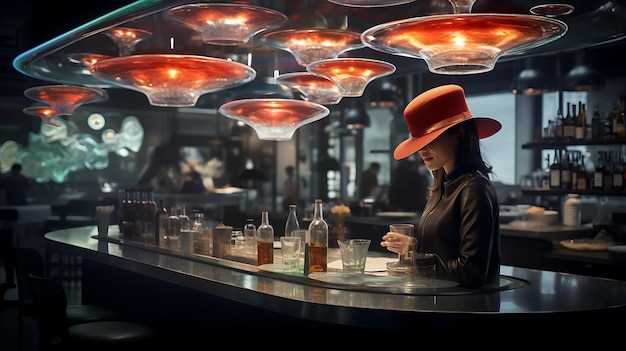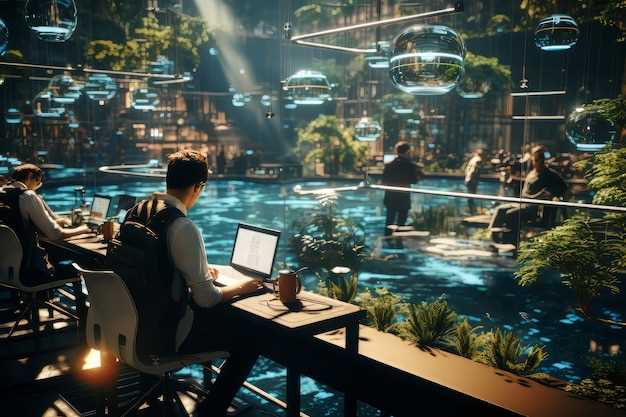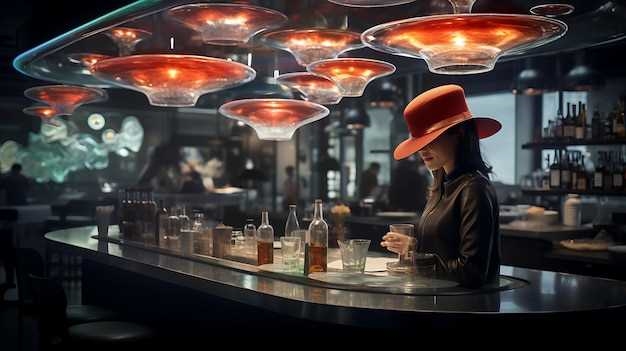
As the realm of hospitality undergoes a profound metamorphosis, a myriad of transformative trends and groundbreaking innovations are reshaping the very essence of this dynamic industry. With an unwavering commitment to excellence and an insatiable thirst for progress, the hospitality sector is embracing a future that is defined by ingenuity, adaptability, and unparalleled guest experiences.
At the heart of this evolution lies a relentless pursuit of novel approaches and inventive solutions, as industry leaders strive to redefine the boundaries of hospitality. From the seamless integration of cutting-edge technology to the cultivation of sustainable practices, these pioneering endeavors are revolutionizing the way we perceive and engage with the world of hospitality.
One of the most prominent trends that is propelling the industry forward is the concept of personalized experiences. Gone are the days of generic, one-size-fits-all services. Today, hospitality providers are harnessing the power of data analytics and artificial intelligence to curate bespoke offerings that cater to the unique preferences and desires of each individual guest. By leveraging these insights, establishments can create unforgettable moments that leave a lasting impression on their clientele.
Moreover, sustainability has emerged as a driving force behind the future of hospitality. With an increasing awareness of the environmental impact of the industry, hotels and resorts are embracing eco-friendly practices and adopting green technologies. From energy-efficient buildings to locally sourced organic cuisine, these initiatives not only reduce the carbon footprint but also resonate with the growing number of environmentally conscious travelers.
In this era of constant connectivity, the integration of technology has become an indispensable aspect of the hospitality landscape. From mobile check-ins and smart room controls to virtual reality tours and chatbot concierges, technology is revolutionizing every facet of the guest experience. By seamlessly blending the physical and digital realms, hotels and resorts are able to provide a seamless and immersive journey for their guests, enhancing convenience, efficiency, and overall satisfaction.
As the hospitality industry continues to evolve, it is these trends and innovations that will shape its future trajectory. By embracing personalization, sustainability, and technology, establishments can create a new paradigm of hospitality that transcends traditional boundaries and sets new standards of excellence. The future of hospitality is a realm of endless possibilities, where imagination and innovation intertwine to create extraordinary experiences for guests around the globe.
Personalized Experiences: How Technology is Revolutionizing Guest Services
In the realm of hospitality, the way guests are served and catered to has undergone a remarkable transformation. This shift can be attributed to the integration of technology, which has revolutionized the way personalized experiences are delivered to guests. By leveraging innovative solutions, hotels and resorts are now able to provide tailored services that cater to the unique preferences and needs of each individual guest.
Enhanced Guest Profiles
One of the key ways technology is revolutionizing guest services is through the creation of enhanced guest profiles. With the help of advanced data analytics and artificial intelligence, hotels can now gather and analyze vast amounts of information about their guests. This includes their preferences, past experiences, and even their social media activity. By understanding these insights, hotels can create personalized experiences that exceed guest expectations.
Seamless Digital Interactions
Another significant aspect of how technology is revolutionizing guest services is through seamless digital interactions. From the moment a guest makes a reservation to the time they check out, technology enables hotels to provide a seamless and personalized experience. Mobile apps, chatbots, and virtual concierges allow guests to easily communicate their preferences, make requests, and receive personalized recommendations. This not only enhances convenience but also creates a sense of exclusivity and luxury for the guests.
- Personalized room settings based on guest preferences
- Recommendations for local attractions and activities based on guest interests
- Customized dining experiences tailored to dietary restrictions and preferences
- Automated check-in and check-out processes for a hassle-free experience
In conclusion, technology has played a pivotal role in revolutionizing guest services in the hospitality industry. Through enhanced guest profiles and seamless digital interactions, hotels are now able to provide personalized experiences that cater to the unique preferences and needs of each individual guest. This not only enhances guest satisfaction but also sets the stage for the future of hospitality, where technology continues to shape and redefine the industry.
Sustainability in Hospitality: Embracing Eco-friendly Practices for a Greener Future
In the realm of the hospitality industry, there is a growing recognition of the importance of sustainability and the need to adopt eco-friendly practices. This section explores the concept of sustainability in hospitality and highlights the significance of embracing environmentally conscious initiatives for a more sustainable and greener future.
Within the realm of hospitality, the concept of sustainability encompasses a range of practices that aim to minimize negative environmental impacts while maximizing positive social and economic outcomes. By adopting eco-friendly practices, hotels, resorts, and other hospitality establishments can contribute to the preservation of natural resources, reduce waste generation, and promote the well-being of local communities.
Embracing sustainability in hospitality involves various aspects, such as energy efficiency, waste management, water conservation, and responsible sourcing. By implementing energy-efficient technologies and practices, establishments can reduce their carbon footprint and minimize energy consumption. Proper waste management strategies, including recycling and composting, can help minimize the amount of waste sent to landfills. Water conservation measures, such as installing low-flow fixtures and implementing water-saving initiatives, can contribute to the preservation of this precious resource. Additionally, sourcing products and services from local suppliers and supporting fair trade practices can enhance the socio-economic development of the surrounding communities.
Furthermore, sustainability in hospitality extends beyond the physical aspects of operations. It also encompasses the promotion of sustainable tourism practices and the education of guests and staff members. By raising awareness about the importance of eco-friendly behaviors and providing opportunities for guests to engage in sustainable activities, hospitality establishments can inspire positive change and encourage responsible travel. Similarly, educating staff members about sustainability practices and empowering them to implement these practices in their daily operations can create a culture of environmental responsibility within the organization.
In conclusion, sustainability in hospitality is a crucial aspect of shaping a greener future for the industry. By embracing eco-friendly practices, hospitality establishments can contribute to the preservation of the environment, support local communities, and inspire positive change. Through energy efficiency, waste management, water conservation, responsible sourcing, and the promotion of sustainable tourism practices, the hospitality industry can play a significant role in creating a more sustainable and environmentally conscious future.
Artificial Intelligence in Hospitality: Enhancing Efficiency and Guest Satisfaction
In the ever-evolving landscape of the hospitality industry, the integration of artificial intelligence (AI) has emerged as a game-changer. AI technologies are revolutionizing the way hotels and resorts operate, enhancing efficiency, and elevating guest satisfaction. By leveraging the power of AI, hospitality businesses can streamline operations, personalize guest experiences, and optimize resource allocation.
One of the key benefits of AI in the hospitality industry is its ability to automate repetitive tasks, freeing up valuable time for staff to focus on more complex and personalized guest interactions. AI-powered chatbots, for example, can handle routine inquiries and provide instant responses, ensuring round-the-clock availability and reducing the workload on front desk personnel. This not only improves operational efficiency but also enhances guest satisfaction by delivering prompt and accurate information.
Moreover, AI enables hotels to offer personalized experiences tailored to individual guest preferences. By analyzing vast amounts of data, AI algorithms can identify patterns and make intelligent recommendations, such as suggesting personalized room amenities or recommending nearby attractions based on a guest’s interests. This level of personalization creates a sense of exclusivity and enhances guest satisfaction, leading to increased loyalty and positive word-of-mouth.
AI also plays a crucial role in optimizing resource allocation within the hospitality industry. By analyzing historical data and real-time information, AI algorithms can predict demand patterns and optimize inventory management, ensuring that hotels have the right amount of supplies and staff at any given time. This not only reduces costs but also minimizes wastage and improves overall operational efficiency.
In conclusion, the integration of artificial intelligence in the hospitality industry is transforming the way hotels and resorts operate. By automating tasks, personalizing guest experiences, and optimizing resource allocation, AI enhances efficiency and guest satisfaction. As technology continues to advance, the potential for AI to revolutionize the hospitality industry is limitless, promising a future where seamless and personalized experiences are the norm.
The Rise of Virtual Reality: Transforming the Way Guests Explore and Book Accommodations
In the ever-evolving landscape of the hospitality industry, a new trend is emerging that is revolutionizing the way guests explore and book accommodations. Virtual reality (VR) technology has gained significant momentum, offering a transformative experience that allows guests to immerse themselves in a virtual world and explore potential accommodations from the comfort of their own homes.
Enhancing the Guest Experience
Virtual reality provides a unique opportunity for guests to visualize and experience accommodations in a way that traditional methods cannot replicate. Through VR headsets or even mobile devices, guests can virtually walk through hotel rooms, explore amenities, and get a realistic sense of the space and ambiance. This immersive experience not only enhances the guest’s understanding of the property but also helps them make more informed decisions when booking.
Furthermore, VR technology allows guests to explore the surrounding areas and attractions, providing a comprehensive view of the destination. They can virtually visit nearby landmarks, experience local activities, and get a feel for the overall atmosphere. This level of exploration goes beyond static images or videos, giving guests a more interactive and engaging way to plan their stay.
Streamlining the Booking Process
Virtual reality is also transforming the way guests book accommodations. By offering a virtual tour of the property, guests can make more confident decisions without relying solely on reviews or descriptions. This not only saves time but also reduces the likelihood of disappointment upon arrival.
Additionally, VR technology can be integrated into booking platforms, allowing guests to book directly from the virtual tour. This seamless integration streamlines the booking process, eliminating the need for multiple steps and providing a convenient and efficient way for guests to secure their accommodations.
In conclusion, the rise of virtual reality is reshaping the hospitality industry by revolutionizing the way guests explore and book accommodations. With its ability to enhance the guest experience and streamline the booking process, VR technology is becoming an essential tool for both guests and hospitality businesses alike.
The Power of Data Analytics: Leveraging Guest Insights for Enhanced Operations and Marketing
In today’s ever-evolving hospitality landscape, the ability to harness the power of data analytics has become a game-changer for businesses. By leveraging guest insights, hotels and other hospitality establishments can gain a deeper understanding of their customers, optimize their operations, and create targeted marketing strategies that drive success.
Unlocking Guest Insights
Data analytics allows hospitality businesses to collect and analyze vast amounts of information about their guests. This includes demographic data, preferences, booking patterns, and feedback. By utilizing advanced analytics tools, establishments can uncover valuable insights that help them tailor their offerings to meet the specific needs and desires of their guests.
For example, by analyzing guest preferences, hotels can personalize the guest experience by offering customized amenities, room layouts, or even curated recommendations for local attractions and dining options. This level of personalization not only enhances guest satisfaction but also fosters loyalty and encourages repeat visits.
Optimizing Operations and Marketing Strategies

Data analytics also plays a crucial role in improving operational efficiency within the hospitality industry. By analyzing data on guest behavior, establishments can identify trends and patterns that allow them to streamline their operations and allocate resources more effectively.
For instance, by analyzing booking patterns, hotels can optimize their room inventory management, ensuring that they have the right number and type of rooms available at any given time. This not only maximizes revenue but also minimizes the risk of overbooking or underutilization of resources.
Furthermore, data analytics enables hospitality businesses to develop targeted marketing strategies. By understanding guest preferences and behaviors, establishments can create personalized marketing campaigns that resonate with their target audience. This can include tailored email promotions, social media advertisements, or loyalty programs that offer relevant rewards and incentives.
The Future of Data Analytics in Hospitality
The power of data analytics in the hospitality industry is only set to grow in the future. As technology continues to advance, establishments will have access to even more sophisticated tools and algorithms that can extract valuable insights from vast amounts of data.
Additionally, the integration of artificial intelligence and machine learning will enable businesses to automate data analysis processes, allowing for real-time decision-making and personalized guest experiences. This will further enhance operational efficiency and enable establishments to stay ahead of the competition.
In conclusion, data analytics has become an indispensable tool for the hospitality industry. By leveraging guest insights, establishments can optimize their operations, create personalized experiences, and develop targeted marketing strategies that drive success in an increasingly competitive landscape.
The Role of Robotics in Hospitality: Exploring Automation and its Impact on the Industry
In this section, we will delve into the significant role that robotics plays in the hospitality industry, specifically focusing on the implementation of automation and its profound impact on various aspects of the sector. By embracing cutting-edge technology and integrating robotic systems, businesses in the hospitality industry are revolutionizing the way they operate, enhancing efficiency, and providing an elevated guest experience.
Enhancing Efficiency and Streamlining Operations
One of the key advantages of incorporating robotics in hospitality is the ability to enhance efficiency and streamline operations. Robots can perform repetitive tasks with precision and speed, reducing the need for human intervention in mundane and time-consuming activities. From automated check-in and check-out processes to robotic housekeeping, these intelligent machines can significantly reduce operational costs and optimize resource allocation.
Transforming Guest Experience
Automation in the hospitality industry has the potential to transform the guest experience, offering personalized and seamless services. With the integration of robotics, hotels and resorts can provide innovative amenities such as robotic concierge services, automated room service delivery, and interactive AI-powered assistants. These advancements not only enhance convenience for guests but also create a unique and memorable stay, setting businesses apart from their competitors.
- Robotic concierge services offer 24/7 assistance, providing guests with instant information and recommendations.
- Automated room service delivery ensures prompt and accurate delivery of orders, minimizing wait times and errors.
- Interactive AI-powered assistants can understand and respond to guest inquiries, offering personalized recommendations and enhancing communication.
By leveraging robotics, the hospitality industry can elevate the overall guest experience, fostering customer loyalty and satisfaction.
However, it is important to note that while automation brings numerous benefits, it also raises concerns about the potential displacement of human workers. As the industry embraces robotics, it is crucial to find a balance between automation and human interaction, ensuring that the human touch and personalized service remain integral to the hospitality experience.
In conclusion, the role of robotics in the hospitality industry is rapidly evolving, revolutionizing operations and transforming the guest experience. By embracing automation, businesses can enhance efficiency, streamline operations, and provide personalized services, ultimately shaping the future of the industry.
